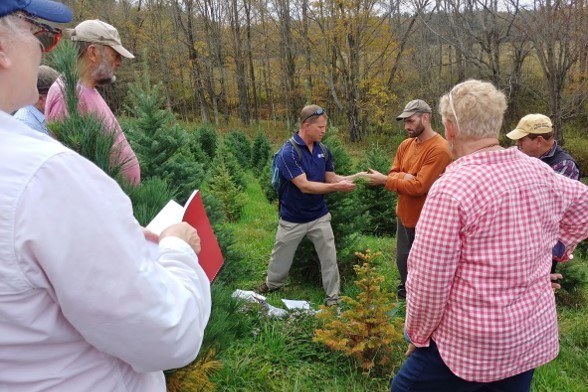Learn to identify woody ornamentals while gaining an understanding of their cultural requirements and associated insect and disease problems.

Conifer Identification class in Susquehanna County
Success in the landscape begins with a comprehensive knowledge of plant material available in the trade and matching site conditions with appropriate woody plants. The certificate program in woody plant identification will train Master Gardeners in the identification of woody ornamental plants. Participants will learn the site and cultural requirements of each plant, as well as its associated insect and disease problems. Classes cover both native and non-native species.
This advanced training in plant identification will prepare Master Gardeners to become more proficient in answering gardening questions. Master Gardeners are also encouraged to share the knowledge they have gained to educate community residents by presenting individual classes or workshops.
Eligibility
To enroll in an advanced certificate program, you must be an active, certified Penn State Extension Master Gardener in good standing and affiliated with one of the county Master Gardener programs.
Class Requirements
To receive a Woody Plant Identification Advanced Certificate, you must attend all of the required modules. The statewide Master Gardener program works with Extension Educators to offer at least two modules per year in a hybrid format (see below for more details on modules). After completing Module 1, modules can be taken in any order. Module credits do not expire (i.e. a Master Gardener could take 1 module per year and finish their certificate in 5 years, or do two modules each year and finish in 3 years).
General Requirements
- To enroll in this program, a Master Gardener must be in good standing and affiliated with one of the county Penn State Extension Master Gardener programs.
- Advanced Certificate Program courses qualify as Master Gardener continuing education hours.
- No additional volunteer service hours are required to earn the Woody Plant Identification Advanced Certificate.
- Module 1 is online and free. See additional information below.
- Modules 2-6 are hybrid classes with online lectures, an in-person plant walk, and a homework assignment. Each module includes a full-color manual of the course plants. Instructors administer both pre-tests and post-tests for these modules.
Module 1: Part A. Taxonomy and Nomenclature
Prerequisite, 2 hours
This core class provides the foundation for plant identification. You will become familiar with the terminology used to classify and name plants while gaining more confidence in using scientific nomenclature.
Module 1: Part B. Plant Morphology
Prerequisite, 1.5 hours
Knowledge of the physical form of plants is necessary for plant identification and classification. in this core class, you will study both reproductive and vegetative structures of plants as well as their growth habit.
Module 1 is free and is offered online to current Master Gardeners and trainees. To access the Module 1 folder, log into the HandsOnConnect Volunteer Portal, then click "Resources" under Quick Actions.
Module 2: Broadleaf Evergreens
4 hours
Broadleaf evergreen shrubs add year-round structure, color, texture, and form to the landscape. Colorful flowers and fruits enhance the appeal of these garden stalwarts used as specimens and also in foundation, screening, and mixed border plantings.
Module 3: Conifers
6 hours
Conifers provide the structural framework for many gardens, serving a variety of roles as specimens, focal points, screens, hedges and backdrops. They offer bold contrasts of foliage color and texture as well as distinctive growth habits.
Module 4: Deciduous Shrubs
8 hours
Shrubs unify the landscape, connecting taller shade and flowering trees to ground level plantings. Deciduous shrubs provide food and nesting sites for birds, attractive flowers and fruits, and a variety of foliage textures and colors from spring to autumn.
Module 5: Flowering Trees
6 hours
Flowering trees provide multiple seasons of interest to the landscape with flowers, fruits, foliage color, form and bark. Available selections in a range of sizes make these trees suitable for large rural landscapes as well as small urban spaces.
Module 6: Shade Trees
6 hours
Shade trees are a long-lived investment. They provide a calm and peaceful environment while increasing the property value of your home. Shade trees attract birds and other wildlife, lower energy costs, improve water quality by reducing runoff and erosion.

